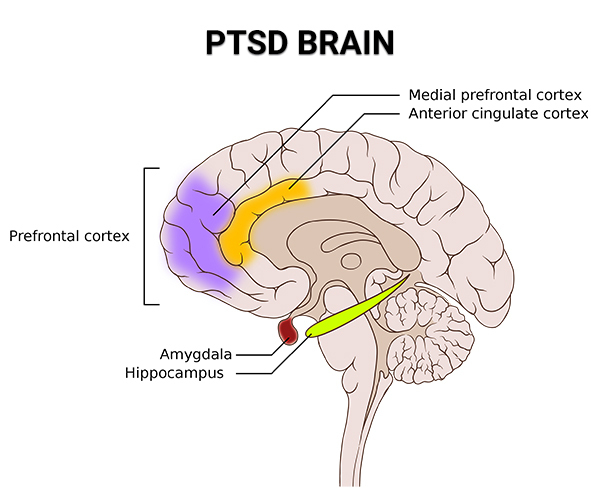

Dealing with overwhelming memories of a traumatic event and the extreme fear associated with the trauma can be challenging. Post-Traumatic Stress Disorder can affect your mental health if it is not addressed timely. Whether you have returned from military service or war, or a traumatic event has happened to you, or you have witnessed one, find support before it affects your overall well-being. Dr. Zlatin Ivanov is highly trained in the diagnosis and treatment of PTSD and helps you cope with the lingering effects of trauma. He offers the insight and guidance you need to progress, and regain a sense of peace and joy in your life and relationships.
PTSD is a stress disorder that can happen to anyone, especially those who experience an intense or life-threatening event. PTSD differs from acute stress disorder as the experiences are more long-term and usually disturb daily life. Symptoms can appear as soon as the end of the episode or even years later if a similar accident triggers the memory of the traumatic event. PTSD is a multidimensional disorder with different causes and outcomes.
PTSD often begins with a normal stress response that may develop into PTSD. Some people might not even be aware they are having symptoms of PTSD. Stress disorders and PSTD can have similar symptoms that may even occur in the same way, but there are differences in the way each type is managed.
Research suggests there are several different types of PSTD. If you have witnessed trauma, been close with someone who experienced trauma, or lived through a life-threatening situation, you may be struggling with one of these five types of PTSD.

Read more: What Is Angel Dust?
Knowing about the types and finding which type you are experiencing can help you better understand your condition and seek professional help for treatment options.
Normal stress response occurs before PTSD begins, but not all stress responses develop into PTSD or a full-blown disorder. It affects the nervous, endocrine, and immune systems. The physiological effect of the stress response activates the fight-or-freeze reaction in the body. This response allows the body to fight or leave the situation and activates adrenaline. However, some people may eventually develop PTSD, depending on how they get help.
Events that may trigger a normal stress response include:
Once the threat is over, the body turns to pre-arousal levels. Normal stress responses do not have long-term side effects or affect day-to-day life. You should see recovery within a few weeks if you suffer from the normal stress response. The best treatment for normal stress response is psychotherapy and support from loved ones, friends, and individual or group therapy sessions. Having someone to talk with or vent out can help to ease the stress and anxiety.
Acute stress disorder can occur in people exposed to what is or feels like a life-threatening event, but symptoms can start between 3 days and 1 month after the event. Studies reveal that you can develop acute stress disorder within 1 month of a traumatic event. However, this rate is different for each type of trauma.
Natural disasters, the loss of a loved one, losing a job, or the risk of death are some factors that trigger acute stress disorder. Symptoms of acute stress disorder include headaches, sweating, chest pain, palpitations, nausea, and stomach pain.
Acute stress disorder can occur in the following cases:
If left untreated, acute stress disorder can develop into PTSD. It can be treated with individual and group therapy, including cognitive behavioral therapy (CBT), medication, and intensive treatments depending on the symptoms you experience. CBT can reduce symptoms and prevent them from developing into PTSD.
Uncomplicated PTSD may be similar to other types of PTSD, but it is associated with one major traumatic event, such as a specific accident or natural disaster. However, it may involve persistent recurring of the traumatic event. It does not coexist with other mental health conditions, such as depression, or deal with multiple events.
Symptoms of uncomplicated PTSD include:
Uncomplicated PSTD is one of the most commonly diagnosed and easiest forms of PSTD to treat than other types. It can be successfully treated through therapy, psychiatric medications, or both.
It is the opposite of uncomplicated PSTD and is caused by multiple traumatic events. Complicated PSTD occurs when repeated or multiple traumas happen over months or even years. It is usually found in violent attacks, car accidents, abuse or domestic violence cases, repeated exposure to war or community violence, or sudden loss.
Complex PTSD symptoms can occur in childhood or adulthood and also lead to physical health issues such as fatigue and chronic pain and cause problems in relationships and behaviors.
Individuals can exhibit behavioral issues such as:
People with complex PSTD can be diagnosed with borderline or antisocial personality disorder or dissociative disorders. Treatment of chronic trauma PSTD is a little more intense, takes longer time, and recovery also takes place at a slower rate. Trauma specialists have to come up with a highly structured managed plan to address the symptoms.
Read more: 5 OCD Treatment Options To Consider
Comorbid PSTD deals with more than one mental condition or disorder and is often combined with substance abuse issues. It is also known as a co-occurring disorder, as it usually co-occurs with other conditions.
Some common co-occurring conditions include:
Comorbid PSTD is very common, as many people suffer from more than one condition at a time. It can be best treated by targeting both the mental health condition and symptoms of comorbid PSTD at the same time. Many people suffering from PSTD try to treat it on their own, but self-medication can lead to other destructive behaviors. Using drugs or alcohol to get rid of the pain or to numb the trauma only worsens the problem and prolongs treatment.
There are many ways the body may respond to a traumatic event or go through the same symptoms. No two people react the same way or experience the same symptoms. Post-traumatic stress disorder is one condition that has different subtypes. While one person may develop PSTD after a traumatic experience, another may not.
If you are experiencing symptoms of PTSD, do not panic as there are many ways to find help and recover successfully. Finding a licensed and trained mental health professional specializing in trauma is the first step toward treatment. Call Online Psychiatrists today for reliable and timely support to manage the traumatic thoughts and fears that control you. Dr. Zlatin Ivanov helps you identify the triggers and symptoms of post-traumatic stress disorder and comes up with personalized treatment plans that focus on speedy recovery and long-term well-being.

Dr. Zlatin Ivanov, MD, is an adult psychiatrist specializing in addiction treatment, ADHD, anxiety, depression, and OCD. He offers exceptional talk therapy and medication management through online video conferencing.
Dr. Ivanov is double board certified in Psychiatry and Clinical Neurology and a member of the American Psychiatric Association. His medical career is colored by many outstanding contributions to medicine, including several publications, research, and scientific presentations. An attending psychiatrist at Woodhull Medical Center in Brooklyn, NY, and Bellevue Hospital Center in New York City, he takes the time to listen to patients and makes sure they know he is committed to their unique situation.
 Our Locations
Our Locations
The Chrysler Building
405 Lexington Ave, #2601
New York, NY, 10174 (map)
300 Carnegie Center Drive #150K,
Princeton, NJ, 08540 (map)
701 Brickell Avenue, 1550#A,
Miami, FL, 33131 (map)